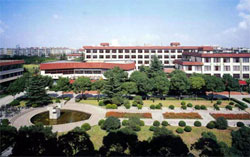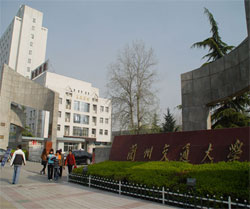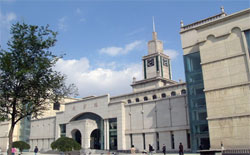
 Lanzhou University, founded in 1909 is a major research university located in Lanzhou, Gansu Province, China. It is one of the key universities under Ministry of Education, China (Project 985 & Project 211). It is also the best comprehensive university in northwest of China. It provides programs for undergraduate, graduate students on four campuses—three in Lanzhou city centre and one in Yuzhong which is about 30 miles away from the main campus. Total enrollment is approximately 20,000. Undergraduate students study at the Yuzhong campus. There are 6 National Bases for the Training of Researching and Teaching personnel for Fundamental Disciplines. The disciplines of Lanzhou University covers 11 fields in total, including science, technology, law, agriculture, literature, history, economics, philosophy, management, medical and pedagogy. Now the university has 8 national-level key disciplines, 2 national level developing disciplines, 27 provincial-level disciplines and 33 provincial medical and healthcare key disciplines. The University operates the key laboratory of Applied Organic and 6 laboratories of Arid and Grassland Ecology, West China Environment, Magnetism and Magnetic Materials, Arid and Agro-ecology, Semi-Arid Climate Change of the Ministry of Education, a key laboratory of Grassland Agro-ecosystem of the Ministry of Agriculture. In addition, there are 1 Key Open Laboratory of Grassland Agro-ecosystems under the ministry of Agriculture, 2 Key Research Institute of Humanities and Social Sciences, 4 Engineering Research Center under the Ministry of Education, and 1 China-Germany Research Center under the National Natural Science Foundation of China. Lanzhou University was one of the first universities entitled to enroll Bachelor Master’s and Doctoral degree candidates in 1981. Lanzhou University is one of the top ten universities in contributions to academic publications in international journals frequently cited by ongoing research from around the world.
Lanzhou University, founded in 1909 is a major research university located in Lanzhou, Gansu Province, China. It is one of the key universities under Ministry of Education, China (Project 985 & Project 211). It is also the best comprehensive university in northwest of China. It provides programs for undergraduate, graduate students on four campuses—three in Lanzhou city centre and one in Yuzhong which is about 30 miles away from the main campus. Total enrollment is approximately 20,000. Undergraduate students study at the Yuzhong campus. There are 6 National Bases for the Training of Researching and Teaching personnel for Fundamental Disciplines. The disciplines of Lanzhou University covers 11 fields in total, including science, technology, law, agriculture, literature, history, economics, philosophy, management, medical and pedagogy. Now the university has 8 national-level key disciplines, 2 national level developing disciplines, 27 provincial-level disciplines and 33 provincial medical and healthcare key disciplines. The University operates the key laboratory of Applied Organic and 6 laboratories of Arid and Grassland Ecology, West China Environment, Magnetism and Magnetic Materials, Arid and Agro-ecology, Semi-Arid Climate Change of the Ministry of Education, a key laboratory of Grassland Agro-ecosystem of the Ministry of Agriculture. In addition, there are 1 Key Open Laboratory of Grassland Agro-ecosystems under the ministry of Agriculture, 2 Key Research Institute of Humanities and Social Sciences, 4 Engineering Research Center under the Ministry of Education, and 1 China-Germany Research Center under the National Natural Science Foundation of China. Lanzhou University was one of the first universities entitled to enroll Bachelor Master’s and Doctoral degree candidates in 1981. Lanzhou University is one of the top ten universities in contributions to academic publications in international journals frequently cited by ongoing research from around the world.
 Ever since the fall of 1987, Lanzhou University has been entitled to accept international students, among the universities authorized by the Ministry of Education. In 2002, the School of International Cultural Exchange was established to be responsible for the admission, instruction and the management of international students. In April.2008, Lanzhou University has been appointed as one of the higher institutions which is entitled to independently enroll degree program international students, the international student education has been developing tremendously. So far over 400 international students from 36 countries are studying on our campus under various kinds of programs. Lanzhou University has three primary laboratories and analytical testing facility sanctioned by the Chinese Ministry of Education and deemed as high importance to the state. Laboratory of Arid Agro ecology, Laboratory of Applied Organic Chemistry and Open Laboratory of Applied Magnetism.
Ever since the fall of 1987, Lanzhou University has been entitled to accept international students, among the universities authorized by the Ministry of Education. In 2002, the School of International Cultural Exchange was established to be responsible for the admission, instruction and the management of international students. In April.2008, Lanzhou University has been appointed as one of the higher institutions which is entitled to independently enroll degree program international students, the international student education has been developing tremendously. So far over 400 international students from 36 countries are studying on our campus under various kinds of programs. Lanzhou University has three primary laboratories and analytical testing facility sanctioned by the Chinese Ministry of Education and deemed as high importance to the state. Laboratory of Arid Agro ecology, Laboratory of Applied Organic Chemistry and Open Laboratory of Applied Magnetism.
History
Lanzhou University had formerly been one of China’s premier institutions of higher learning with its position as the best university in Northwestern China. Lanzhou University maintains one of China’s top ten Ph.D. programs in physics, chemistry, and geography and highly ranked programs in information science, biology, botany, mathematics, history, media, ecology and Chinese literature.
 Lanzhou University’s main campus is a ten-minute walk from Lanzhou Train Station. Parts of the campus are considered aesthetically pleasing, particularly in comparison to the rest of highly industrialized Lanzhou, with a small park and man-made pond. Although the old dormitory buildings were in disrepair, the campus is undergoing an overhaul of its image. New dormitories are being built, with some finished already.
Lanzhou University’s main campus is a ten-minute walk from Lanzhou Train Station. Parts of the campus are considered aesthetically pleasing, particularly in comparison to the rest of highly industrialized Lanzhou, with a small park and man-made pond. Although the old dormitory buildings were in disrepair, the campus is undergoing an overhaul of its image. New dormitories are being built, with some finished already.
Lanzhou University employs instructors from outside China in foreign languages and in physics, as well as frequently inviting guest lecturers from a variety of fields. It also has a popular Friday gathering within the gardens of the university to allow students to practice their English language skills. Non-university students are generally allowed to attend such gatherings.
Fee Structures
General Medicine – 25000 RMB/Year
Hostel – 4000 RMB/Year
